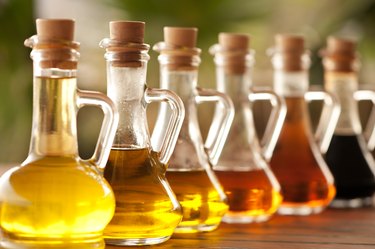
While we don't know exactly what causes psoriasis, its trademark skin plaques or scales are a clear sign of inflammation in the body, per the National Psoriasis Foundation. That's why inflammatory triggers can cause psoriasis flares for some people, including stress, smoking and, yes, certain foods.
"Avoiding inflammatory foods and incorporating anti-inflammatory foods into the diet can be helpful in managing inflammatory diseases such as psoriasis," Nicole Cotter, MD, a board-certified rheumatologist at UCHealth Rheumatology Clinic in Steamboat Springs, Colorado, tells LIVESTRONG.com.
Video of the Day
Video of the Day
It's important to understand that there is no one known diet that will cure psoriasis, and the types of foods that can cause a flare-up may be highly individual. For instance, while gluten may be a trigger for you, that doesn't necessarily mean it will cause symptoms in another person with psoriasis.
But there are a few broad recommendations for decreasing inflammation in the body if you have psoriasis. These are some of the foods you may want to avoid or limit to help you manage your symptoms.
1. Foods With Added Sugar
Sugar has long been linked to inflammation in the body, and a February 2020 study in the Journal of Investigative Dermatology found that even short-term exposure to a diet high in added sugar provoked psoriasis.
There are sugars that occur naturally in some foods, like fruit and dairy, but added sugar refers to sweeteners added to a food during processing (you'll see this listed on its own line on the food's nutrition label).
According to Harvard Health Publishing, common foods with added sugar include:
- Sweetened beverages like soda and energy drinks
- Desserts and candy
- Ready-to-eat cereals
- Some breads
Reducing your added sugar intake may have the added benefit of lowering your risk of cardiovascular disease.
"Generally speaking, the same eating patterns that prevent obesity and cardiovascular disease may be beneficial for psoriasis," Hannah Van Ark, RDN, a UCHealth clinical dietitian, tells LIVESTRONG.com.
Related Reading
2. Refined Carbohydrates
Refined carbs are any carbohydrates that have been highly processed so they are no longer in their original form. These include:
- White rice
- White bread and flours
- Convenience foods like crackers, chips, cookies, granola bars, energy bars and breakfast cereals
Refined carbs are associated with inflammation in the body, according to the Cleveland Clinic. To avoid them, try to focus on eating foods as they came in nature: brown rice instead of white, steel-cut oats instead of cereal or an apple instead of that apple-flavored energy bar.
Van Ark also suggests turning to sweet blueberries, filling black beans and leafy greens for fuel instead of refined carbs.
"These foods contain antioxidants, which fight inflammation-causing free radicals in the body," she notes.
Related Reading
3. Refined Cooking Oils

Whenever possible, Dr. Cotter suggests avoiding cooking with refined oils, which include:
- corn oil
- cottonseed oil
- peanut oil
- rice bran oil
- sesame oil
- soybean oil
- sunflower oil
These omega-6-rich oils have been linked to chronic low-grade inflammation, per a September 2018 Open Heart study.
Instead, look for unrefined cooking oils, such as extra-virgin olive oil, raw coconut oil and cold-pressed avocado oil.
If you find yourself missing the flavor of refined oils in your cooking, consider sprinkling in some zing in the form of herbs and spices. Turmeric, specifically, may help minimize psoriasis in some people, according to the National Psoriasis Foundation.
4. Red, Processed or Fatty Cuts of Meat
"Saturated fat increases inflammation in the whole body through many pathways, and excessive intake may possibly worsen psoriasis," Van Ark says.
She notes that any type of high-fat meat will also have high levels of saturated fat, so these should be limited. Especially:
- Red meat like hamburger and steak
- Processed deli meats like salami
To further help your psoriasis, you'll want to swap those saturated fats for some healthy omega-3 fatty acids, which can help reduce chronic inflammation, Van Ark says. So, instead of steak for dinner, opt for salmon and a salad topped with walnuts and flax seeds.
Related Reading
5. Alcohol
Psoriasis may be triggered or worsened by alcohol intake, Van Ark says.
Keep in mind that, for anyone, the Centers for Disease Control and Prevention recommend drinking alcohol in moderation, which means no more than one to two drinks per day.
She recommends discussing with your doctor if it is safe for you to consume alcohol in moderation, or if you should skip it altogether.
6. Foods You Don't Tolerate Well
Dr. Cotter notes that negative reactions — including psoriasis flare-ups — can occur with foods you have an intolerance to. Specific intolerances vary from person to person, so the key is figuring out which foods may be triggers for you personally.
For example, she says some of her patients have seen their psoriasis symptoms improve after eliminating foods like gluten and dairy. An elimination diary or food journal may be helpful tools for you to track your own diet and symptoms to share with your doctor and explore possible links.
If you go the elimination route, the idea is to remove just one food item at a time — like gluten — for a few weeks, then add it back into your diet. You're experimenting to see if your psoriasis symptoms resolve on removal and return on reintroduction. Make sure you work closely with your doctor or dietitian to go about this safely, so you don't end up cutting important nutrients from your diet.
Related Reading
7. Too Many Animal-Based Products
A healthy microbiome is connected to a reduced risk of psoriasis, Van Ark says, so foods that support gut health may help improve psoriasis symptoms.
A healthy microbiome needs fiber, which is only found in plant foods. If you're eating a diet heavy in animal-based products, like dairy, cheese and meat, you'll want to be sure to incorporate more fiber-rich foods, such as vegetables, fruits, beans, whole grains, nuts and seeds.
Another bonus for the plant-based category: In general, plants are anti-inflammatory, Dr. Cotter says.
The Bottom Line
While these dietary changes may be helpful in managing your psoriasis symptom, keep in mind that food triggers for the condition are highly individual. Always be sure to talk with your doctor before changing your diet or adding any type of supplements, especially if you're taking medications for psoriasis or any other health condition.
- National Psoriasis Foundation: "About Psoriasis"
- Harvard Health Publishing: "The Sweet Danger of Sugar"
- Journal of Investigative Dermatology: "Short-Term Exposure to a Western Diet Induces Psoriasiform Dermatitis by Promoting Accumulation of IL-17A–Producing γδ T Cells"
- Open Heart: “Omega-6 Vegetable Oils as a Driver of Coronary Heart Disease: the Oxidized Linoleic Acid Hypothesis”
- National Psoriasis Foundation: "Natural Treatment Options for Psoriasis"
- Cleveland Clinic: "5 Foods That Can Cause Inflammation"
- Centers for Disease Control and Prevention: "Dietary Guidelines for Alcohol"
Is this an emergency? If you are experiencing serious medical symptoms, please see the National Library of Medicine’s list of signs you need emergency medical attention or call 911.